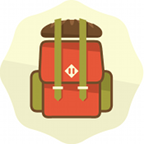We arrived in England like waking from a good rest, when the coffee is fresh and the day unfolds before you, even and civilized, a parade of activities and rewards. Refreshingly, the people spoke our language, and we spoke theirs, more or less, and London, one of the most cosmopolitan, dynamic, overwhelming, but still charming cities in the world, offered up its sights to us (along with several thousand other tourists). We navigated the tube to visit my old neighborhood (more on that in a bit); the British Museum, the Indiana Jonesiest museum ever (i.e., containing powerful relics that Indy might be rescuing, bullwhip in hand, from the clutches of a Nazi and shouting “It belongs in a museum!”); Hampton Court Palace, home of Henry VIII, William and Mary, and all the architecture and history between them; the improbable abundance of landmarks in and around central London, including St. Paul’s Cathedral, the Houses of Parliament, and Leicester and Trafalgar Squares; and Hyde Park, where we had a picnic one especially pleasant evening. We saw The Cripple of Inishmaan, a play starring Daniel Radcliffe, who seems to have avoided the typical fate of famous child actors and has instead chosen to, y’know, act. We went to Bath, where the ruins of ancient spas remain from the time when the Romans ruled England–a reminder that nearly 2,000 years ago they had already figured out most of the things (save for the Internet) we tend to think of as being uniquely modern, from plumbing and HVAC to colonialism. We also went to Nottinghamshire to visit my English cousins, some of the warmest and best-hearted people I know, and they showed us Sherwood Forest, lawn bowling, and cricket, which remains incomprehensible.
All of this was lovely and enriching and, should you get the chance to come here if you haven’t already, well worth your time. But I admit I have a complicated relationship with England, London in particular, one I had a sense of before but couldn’t quite identify until now. This is my seventh trip to England, and in college I spent a semester in London, living in an absurdly posh neighborhood just off of Hyde Park. I love England, and I love English life. I love that they have pubs on nearly every other corner–yes, for the convenience of grabbing a pint whenever your fancy strikes but moreover for the function the pub performs, serving as a sort of community living room where people can drink and gossip with coworkers, take a date or have a night out with a spouse, or wear comfy pants and play Words with Friends on their phones over fish and chips; it is truly a public house, an institution America sorely lacks. I love that the English understand themselves in several ways, with a person’s occupation being just one facet in an overall jeweled life. If we had a good reason to live here–if Bri or I got a job here, one that paid well enough for frequent trips to the states to visit our friends and family–we could live well.
Which is kind of the problem: at this point, I may have gotten everything I can from England as a tourist destination (well, I haven’t seen Madame Tussaud’s, but I’m content to live the rest of my life without seeing a creepy waxy simulacrum of a creepy waxy king of pop). I’m in an in-between state, in which I know England like a home, yet it has little bearing on my regular life. It’s been a magical place I can enter periodically through a rabbit hole or a portal that, for some reason, has manifested inside a dusty old wardrobe, but, as with Alice and the Pevensie kids in their sequels, the terrain on the other side is no longer all that fantastical for me–its strangeness has become familiar, but sooner or later we must leave it, as we are not talking animals or anthropomorphized playing cards.
I suppose this may be a necessary consequence of travel: a blurring of the line between foreign and domestic and the realization that home itself can travel, locating wherever, along with your heart, your ties are. (We’ll see how well this theory holds up in a few months.) I’ll miss England, but–here’s a silver lining–I’ve already grown used to missing it and should, with any luck, be able to cope.

